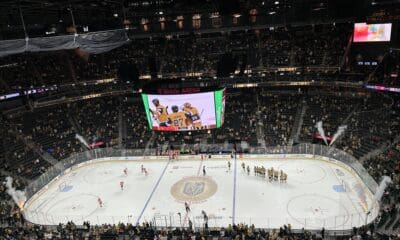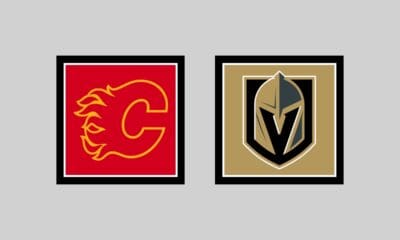Golden Knights Free Agency
New CBA Changes & What They Mean for the Golden Knights

On Tuesday, September 2nd, the NHL and NHL Players Association officially ratified a new Collective Bargaining Agreement. The new CBA is set to take effect on September 16th and includes several critical changes. It includes signing bonus limits, an 84-game regular season, and, most notably, new rules for playoff LTIR usage.
Here is a full list of the new rules, when they take effect, and how they impact the Golden Knights.
New LTIR Rules
To prevent Stanley Cup contenders from loading up on talent at the deadline, new LTIR rules will limit cap relief to the league average salary ($3.82 million in 2024-25) if the injured player is expected to return that season. Now, teams are only allowed full relief if the player is ruled out for both the regular season and the playoffs. Previously, full relief was allowed if the injured player missed 10 games and 24 calendar days.
In addition, teams must now ice a cap-compliant roster during the postseason. Cap hits are not pro-rated, so dead cap from the regular season— like buyouts and buried contracts— counts towards the playoff cap.
For now, this means nothing for the Golden Knights. Alex Pietrangelo is on LTIR; however, general manager Kelly McCrimmon said it was unlikely he would play again. Thus, the Golden Knights will get full cap relief for Pietrangelo’s $8.8 million contract.
New Contract Retention Rules
Teams are no longer allowed to do a “double retention” trade in which a third party retains a portion of the contract all at once. In the future, teams can’t retain on a contract that has already been retained within 75 regular season days of the first retention.
For example, the Noah Hanifin trade at the 2024 deadline would not be possible under the new CBA.
This rule takes effect immediately.
New Contract Term Limits
New contracts are now limited to a maximum of six years for a Free Agent signing, and seven years for signing a player who was on the roster at the last trade deadline. Previously, teams could sign a Free Agent for seven years or re-sign a player for eight years.
In the summer of 2019, the Golden Knights signed Alex Pietrangelo to a seven-year, $61.6 million contract. This new CBA wouldn’t allow for this contract.
This rule goes into effect at the start of the 2026-27 season.
Restrictions to Front-Loaded Deals and Signing Bonuses
Under the new CBA, restrictions are being placed on contract structure. Teams can no longer front-load deals. The difference between adjacent years in a contract is restricted to 20%, and the lowest in any year is limited to 71% of the highest year.
For example, Mitch Marner’s contract wouldn’t be allowed under the new CBA. His front-loaded contract’s highest-salaried year is $15 million, meaning his lowest-salaried year could only be $10.65 million, under the new agreement. However, his final two years come in at $10 million.
Additionally, total signing bonuses are now capped at 60% of the total contract value. Once again, Marner’s contract would not be eligible under the CBA. He signed a $96 million contract, $60 million of which will be paid out in signing bonuses.
This rule goes into effect at the start of the 2026-27 season.
Restrictions on Deferred Salary Contracts
Under the new CBA, contracts can no longer defer salary to future years.
This rule does not affect the Golden Knights, as they don’t have any deferred salary contracts.
This rule goes into effect immediately, effective October 7th, 2025.
New Emergency Goalie (EBUG) Rules
Under the new CBA, each team may now employ an EBUG during the regular season. However, there are some restrictions– EBUGs must not:
- Have played in an NHL game with a standard player contract,
- Have played more than 80 professional hockey games,
- Have played professional hockey in the past three seasons,
- Have another contractual obligation that would preclude the ability to serve as the club’s Emergency Goaltender Replacement, or
- Be on another team’s reserve list or RFA list.
This rule goes into effect at the start of the 2026-27 season.
Other Changes
Beginning in the 2026-27 season, the NHL’s regular season will increase from 82 games to 84.
The new CBA no longer permits “paper loans.” If a player is sent to the minors, he must report to the AHL and play a game before being called back up.
The new CBA increases the post-trade deadline recall maximum from four players to five.
The new CBA updates the value of Qualifying Offers to retain the rights of an RFA. Teams must offer RFAs making under $1.25 million 110% to retain their rights. Teams must offer players making between $1.25 million and $1.75 million 105%, and players over $1.75 million 100% of their current salary.
The new CBA increases the league minimum salary. It will be $850,000 in 2026-27, $900,000 in 2027-28, $950,000 in 2028-29, and $1 million in 2029-30.
The new CBA caps Entry Level Contracts at $1 million next season, and then the league minimum salary plus $175,000.
In the past, emergency call-up players did not count towards the team’s cap. Under the new agreement, the call-up player does count towards the cap, and any cap overages are rolled over into the next season, in a way similar to how performance bonuses are meted out.
The new CBA caps minor league compensation on entry-level contracts.
The new CBA makes players under 35 and not on an ELC eligible for performance bonuses. Under the new agreement, if a player spent more than 100 days on injured reserve, or spent the final 70 days on injured reserve and played in less than two playoff games, he is eligible for performance bonuses.
Beginning in 2026-27, the new agreement will require players with no NHL experience to wear neck guards.













